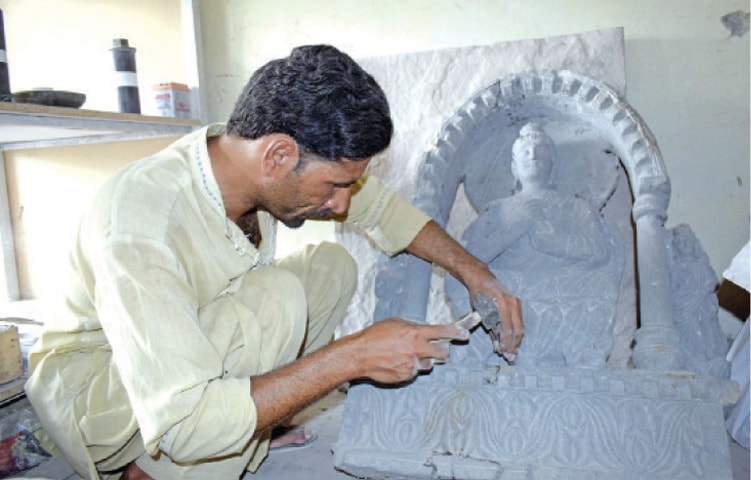
Taxila’s sculptors are known across the world but due to different socio-economic reasons this centuries-old art is on the verge of extinction.
As soon as someone thinks about Taxila, images of master craftsmen carving Buddha statues on black stone come to mind.
Long known the world over for its stone sculptured Buddha statue masterpieces, the art of carving black stone with Greek, Indo-Greek and Persian style is on the extinction.
Stone carving in Taxila is an art which goes back to the 2nd century BC, about a 100 years before Alexander the Great conquered the area.
Taxila, the capital of the great Gandhara civilisation, was also known as the ‘city of artisans’ after its craftsmen who produced the rich, glorious and distinct Gandhara art.
All the artists who were producing these masterpieces of Buddha’s statues and other Buddhist artifacts are today have switched their activities to other profitable businesses.
They are producing other items much popular among the masses and art admirers such as tombstones, langris (mortar and pestle), gravestones, flower pots and decorative pieces from hard stone.
The art of stone carving in Pakistan is as ancient as Buddhism itself as this art has been a centuries-old occupation for scores of families in the Taxila Valley. But with the passage of time this art is on the decline due to the persistent economic condition, lack of patronage from the state, lack of tourists and the law which forbids replicas under the 1975 Antiquities Act.
Anyone who produces replicas is sentenced to imprisonment and subject to fines.
According to Prof Dr Mohammad Ashraf Khan, a former director of the Taxila Institute of Asian Civilisation, roots of these carvers can be traced back to ancient Gandhara as they live between two ancient cities today known as Bhir Mound (the first city of Taxila) and Sirkap (the second city).
This area produced expert artisans who inherited the art from their ancestors and were carving black stone into beautiful shapes and replicas of artifacts for decades.
But things changed for the craftsmen after 9/11 as foreign tourists, especially from Buddhist countries, stopped visiting the city due to security situation in the country. The business flourished from the last many centuries and remained at its peak till the 90s and started to decline after 2000 and collapsed post- 9/11.
“In the 90s, foreign artifacts smugglers found the market cheap and smuggled out hundreds and thousands of Buddha statues and other Buddhist sculptures craved and created by the local sculptors.
“When these masterpieces filled spaces in private museums and drawing rooms in European and Buddhist countries, their purchase by smugglers gradually started to decline and the last ray of hope of these stone carvers collapsed after 9/11,” said Rafeeq Butt, who runs a stone cutting machine near Taxila Museum.
Mr Butt, who spent many decades in European countries, described foreign tourists and art lovers as the lifeline of these stone carvers, adding when these tourists turned their back on Pakistan the local stone craving profession died and now some master craftsmen are running hotels, tea shops, buses or have shifted to tomb carving and pottery making.

“The antiquities act of 1975 added another obstacle,” said 51-year-old master sculptor Ilyas Khan, who has devoted nearly 38 years of his life to Gandharan art.
Mr Khan’s family has been in the stone carving art for more than two centuries. He says he has passed age-old expertise to two generations, including his three younger brothers but all family members turned to other jobs.
“The days when foreign tourists especially from Buddhist countries came here to buy Buddhist carvings and sculptures are long gone, and where we earned well from selling these sculptures, we are now carving tombs and other decorative items so we can feed our families,” he added.
Another master sculptor Rashid Mehmood, 45, who has been carving images of the Buddha into stone and clay for over 18 years, said a number of master sculptors have left the profession.
“Social taboos, societal pressure and a constant threat from religious extremists, who see our work as pagan which, have driven the ancient art of stone carving to collapse.”
Ameen Khan, another sculptor, warned that if proper steps were not taken to transfer this art to the new generation, the city of Taxila would soon become artistically barren.
He said the art of carving Buddha statues crippled as foreign tourist stopped visiting the historic sites due to the law and order situation.
Shafeeq Ahmed, 57, said the craftsmen were facing a bleak future.
Humera Khan, assistant curator at the Taxila Museum, said ancient Taxila was also known as Taka (cut) Shaila (stone) ‘City of cut stones’. She said stone craving art had a rich history influenced by the rise and fall of Achaemenid, Greek, Mauryan, Indo-Greek, Scynthian, Parthian, Khushan, Han and Hindu dynasties.
“Stone chiseling is a hard job, and the art of carving black stone into mortars was introduced during the second century in the Bhir Mound-era, a century before the Greeks came here,” she said.
Dr AG Lone, senior archaeologist at the federal department of archaeology and museums, said the art of stone carving appeared in the region in the 1st century BC, developed further in the 1st century AD, flourished till 5th century and lingered on till 8th century.
Published in Dawn, August 18th, 2019












































Dear visitor, the comments section is undergoing an overhaul and will return soon.